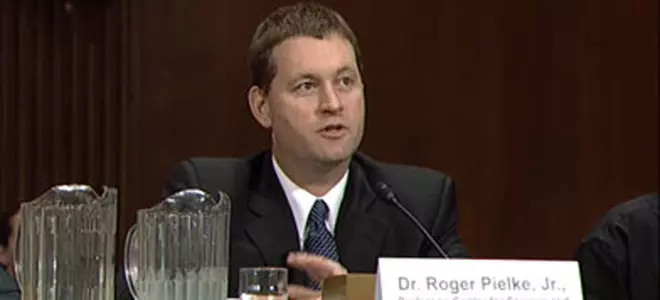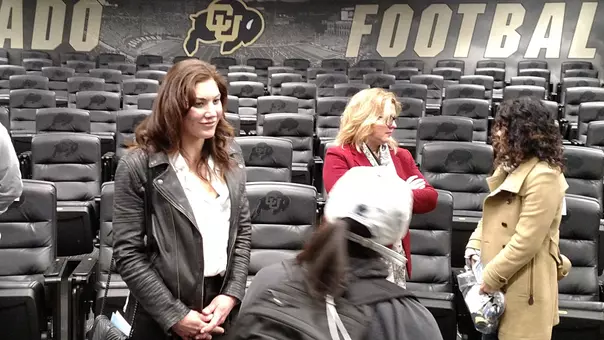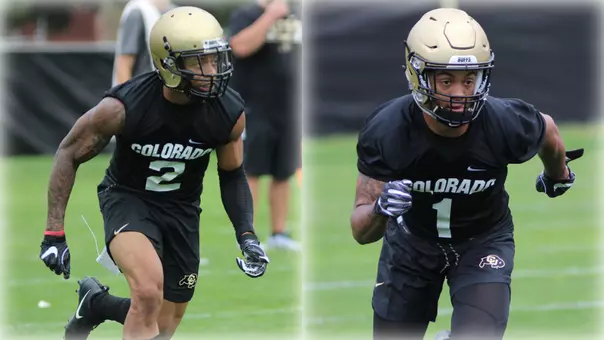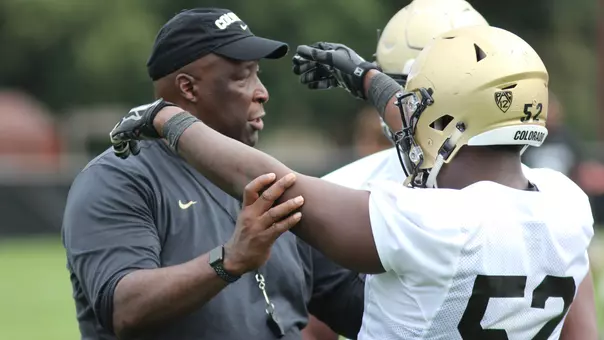Colorado University Athletics

CU Could Become World Leader On Sports Issues
January 05, 2016 | Sports Governance, Neill Woelk
BOULDER — Over the last several months, the name of University of Colorado professor Roger Pielke Jr. has appeared in a wide variety of publications and websites, ranging from the New York Times to the Chicago Tribune to NPR to Australian ABC.
He has been quoted on the recent scandals surrounding FIFA, the world governing body for soccer. He has been sourced as an expert on doping issues in sports. He has moderated a debate between candidates for the FIFA presidency. And, he is earning a reputation as an emerging expert on NCAA governance issues.
So why is a professor in CU's Environmental Studies Program increasingly being turned to for expert commentary on sports issues?
Because Pielke is in the midst of combining three of his passions — sports, science and public policy — into a unique entity that could turn CU into a worldwide leader in an area that he believes has been begging for a platform for years: sports governance.
Pielke is currently a professor in CU's Environmental Studies Program and a Fellow of the Cooperative Institute for Research in Environmental Sciences (CIRES). He also founded CU's Center for Science and Technology Policy Research in 2001.
But along with his long list of academic pursuits and achievements, he's always been a sports fan. He was captain of his high school soccer team at Poudre High in Fort Collins (“before soccer became a thing in Colorado,” he says), and even while pursuing degrees in mathematics, public policy and political science (all from CU), his love of sports always tagged along.
It followed him when he worked as a tutor/mentor for CU athletes in the 1990s, while he was working on his post-graduate degrees at CU. It continued to accompany him as he began teaching a sports governance class at Colorado as part of his policy research pursuits.
And finally, “the sports governance stuff kind of went from curiosity to hobby to a parallel research interest to an all-consuming career thing.”
All of which has led to the formation of the CU Sports Governance Center, an academic research unit that will be operated from within the CU Athletic Department. The proposal for the center has been fast-tracked and submitted for approval, and has already passed the first round of review. If all goes well, it will very soon move from planning stages to reality.
“I'm pretty optimistic that soon after the new year, maybe at the turn of the new semester, we'll be hearing the good news that it's been approved,” Pielke said recently. “So far, all signs are good. I'm very optimistic.”
According to Pielke, the scope of possible topics to be addressed by the SGC is “essentially endless.”
“The issues are everything from why FIFA can't be held accountable to basic norms of business practices to doping in sport to NCAA issues to the question of whether daily fantasy sports are gambling,” Pielke said. “Every single day in this space there's a new and interesting and controversial topic to work on. It's exciting from a teaching and research standpoint, but it also offers up the prospect that we could be doing some stuff to maybe help the sports world do a little bit better.”
Once the center gets final approval, it will be the only one of its kind in the nation — and it would establish CU as the “go-to” source for expertise on sports governance issues.
“There are some wonderful sports law programs and there are some wonderful sports management programs,” Pielke said. “But there's nothing like we've envisioned on sports governance. The next time a scandal breaks — and there will be the next scandal — I'd like policy makers, the media, to say, 'Let's see what those folks at Colorado think.'”
Pielke has already generated plenty of interest among the faculty at CU. The center has identified 12 “self-selected” faculty affiliates on campus who have expressed a desire to become involved. Some do work directly related to sports governance issues; others simply have an interest in the concept.
“It's going to be like any other research center on campus,” Pielke said. “The faculty and the researchers interest will dictate the scope of what we're working on.”
Sports governance issues have existed virtually as long as sports. There has always been a need for rules and governance of leagues, teams and organizations (think FIFA, Olympics, NCAA, etc.)
But what Pielke says was once a “big deal in small circle” has become a big deal worldwide — enough so that more and more sports stories are escaping the traditional sports pages and moving to the front page of newspapers and major news websites
“The footprint that sports has on our culture and on society is much larger than it's ever been,” Pielke said. “There's an enormous amount of money floating around. If you just look at what's happening with the IAAF and FIFA internationally, you see that it involves governance. There's state-sponsored doping. There's state-sponsored corruption associated with FIFA.
“All of a sudden it becomes geopolitical. It becomes a big deal at the biggest level of international politics. It's not just sports in its corner.”
Pielke first approached former athletic director Mike Bohn with the proposal for a sports governance center several years ago. But it has gained serious momentum with the help of current AD Rick George, who sat in on a debate conducted by Pielke's sports governance class on the possibility of NCAA athletes unionizing
“Rick's been tremendously supportive,” Pielke said. “I think we're on to something now.”
George has been supportive of the center since he was first approached about the idea, believing it could be beneficial not only for the athletic department in terms of available research, but also for the university in general, adding to its prestige with another source of expertise.
"I think it can do nothing but be a great benefit to our athletic department and our institution," George told the Boulder Camera last summer.
There are, of course, some interesting questions. The SGC will almost certainly become involved in NCAA issues, meaning there will quite likely be situations that involve the SGC offering criticism of the entity that basically governs CU's athletic department. Why would the CU Athletic Department encourage asking difficult questions about the very group that governs its operations?
“The answer, pure and simple, is leadership,” Pielke said. “Who better to ask difficult questions to help put the house in order than someone who is a participant in that very system? If you actually want to be part of participating in the system that you're trying to improve, sitting outside and throwing stones is not necessarily the best option.”
Pielke is firmly of the belief that athletics are an integral part of the U.S. university system. His Twitter account offers such tidbits as the odds of an NCAA Division I basketball player going on to play pro basketball (29.3 percent) are greater than the odds of people with a doctorate going on to become a professor (8.3 percent).
He also last fall published a paper entitled, “What is wrong with U.S. universities producing millionaire sportsmen for the NFL?” Pielke argues that the monetary support for major college football and basketball programs is a good investment.
“ … for those who argue that universities offer too much attention and financial support to college athletics, the data suggests that this support results in a significant number of elite athletes, earning salaries in the millions of dollars per year. Math and physics, or any discipline, would have a hard time demonstrating such a track record of success. What is wrong with universities supporting programs that lead to hundreds of millionaires?”
As a member of CU's faculty, Pielke is well aware that not all faculty members are supporters of college athletics. But he also knows college athletics aren't going away.
“One of the things I've come to appreciate is just how deeply embedded in the modern U.S. university sports actually is,” Pielke said. “You can pretend that it doesn't exist, which some faculty do; or you can say it's every bit as fundamental to the big-time university as a law school, a business school, a science institute. Let's see if we can work from within that environment to actually do research, education and outreach. There's a lot of talk about the importance of better connecting academics and athletics on campuses, but there's not a lot of action to do that. This is a chance for the University of Colorado to follow words with deeds.”
And, yes, he knows there will be times when the SGC asks difficult questions that might be uncomfortable for athletic administrators.
“Will we ask hard questions? Of course,” Pielke said. “That's what academics do if they do their jobs. But I don't see that there's anything incompatible with being in an institution that does athletics with an institution that asks hard questions about athletics. You can ask hard questions about conflict of interest in science and fraud in science and still do science at the same time.
“In that sense, I don't see athletics as different than any other part of the university. That's the best of the modern university, the ability to practice what we preach and study it.”
Contact: Neill.Woelk@Colorado.edu





